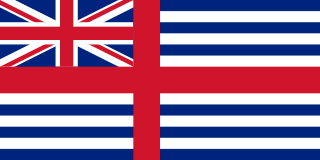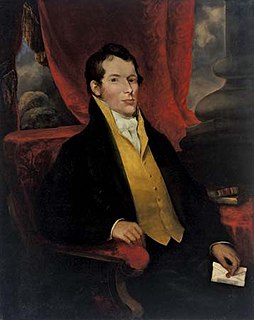Related Research Articles

Van Diemen's Land was the colonial name of the island of Tasmania used by the British during the European exploration of Australia in the 19th century. A British settlement was established in Van Diemen's Land in 1803 before it became a separate colony in 1825. Its penal colonies became notorious destinations for the transportation of convicts due to the harsh environment, isolation and reputation for being inescapable. Macquarie Harbour and Port Arthur are among the most well-known penal settlements on the island.
A governor is an administrative leader and head of a polity or political region, ranking under the head of state and in some cases, such as governors-general, as the head of state's official representative. Depending on the type of political region or polity, a governor may be either appointed or elected, and the governor's powers can vary significantly, depending on the public laws in place locally. The adjective pertaining to a governor is gubernatorial, from the Latin root gubernare.

Common Sense is a 47-page pamphlet written by Thomas Paine in 1775–1776 advocating independence from Great Britain to people in the Thirteen Colonies. Writing in clear and persuasive prose, Paine marshaled moral and political arguments to encourage common people in the Colonies to fight for egalitarian government. It was published anonymously on January 10, 1776, at the beginning of the American Revolution and became an immediate sensation.
The human history of Western Australia commenced between 40,000 and 60,000 years ago with the arrival of Aboriginal Australians on the northwest coast. The first inhabitants expanded across the east and south of the continent.

The State of Rhode Island General Assembly is the state legislature of the U.S. state of Rhode Island. A bicameral body, it is composed of the lower Rhode Island House of Representatives with 75 representatives, and the upper Rhode Island Senate with 38 senators. Members are elected in the general election immediately preceding the beginning of the term or in special elections called to fill vacancies. There are no term limits for either chamber. The last General Assembly election took place on November 3, 2020.
The New South Wales Corps was formed in England in 1789 as a permanent regiment of the British Army to relieve the New South Wales Marine Corps, who had accompanied the First Fleet to Australia, in fortifying the Colony of New South Wales. It gained notoriety for its trade in rum and disobedient behaviour during its service and was disbanded in 1818.

Colonel David Collins was a British Marine officer who was appointed as Judge-Advocate to the new colony being established in Botany Bay. He sailed with Governor Arthur Phillip on the First Fleet to establish a penal colony at what is now Sydney. He became secretary to the first couple of Governors, later being appointed to start a secondary colony where he founded the city of Hobart as the founding Lieutenant Governor of Van Diemen's Land.

John Macarthur was a British Army officer, racketeer, entrepreneur, grazier, usurper, politician, and highly influential figure in the early British colonisation of New South Wales. Macarthur is recognised as the pioneer of the Australian Merino wool industry. He was instrumental in agitating for, and organising, a rebellion against the colonial government in what is often described as the Rum Rebellion.

Chief secretary was the title of a senior civil servant in various colonies of the British Empire. Prior to the dissolution of the colonies, the chief secretary was the second most important official in a colony of the British Empire after the Governor, typically termed the colonial secretary and often an office held by the premier or a similar politically elected minister, and with a portfolio which were equivalent to what was later termed the Home Secretary's office.
The history of Australia from 1788 to 1850 covers the early British colonial period of Australia's history. This started with the arrival in 1788 of the First Fleet of British ships at Port Jackson in the lands of the Eora Nation, and the establishment of the penal colony of New South Wales as part of the British Empire. It further covers the European scientific exploration of the continent and the establishment of the other Australian colonies that make up the modern states of Australia.
Cultural cringe, in cultural studies and social anthropology, is an internalized inferiority complex that causes people in a country to dismiss their own culture as inferior to the cultures of other countries.

The convict era of Western Australia was the period during which Western Australia was a penal colony of the British Empire. Although it received small numbers of juvenile offenders from 1842, it was not formally constituted as a penal colony until 1849. Between 1850 and 1868, 9,721 convicts were transported to Western Australia on 43 convict ship voyages. Transportation ceased in 1868, but it was many years until the colony ceased to have any convicts in its care.

British America comprised the colonial territories of the English Empire, which after the 1707 union of the Kingdom of England with the Kingdom of Scotland to form the Kingdom of Great Britain became the British Empire, in the Americas from 1607 to 1783. Prior to the union, this was termed English America, excepting Scotland's failed attempts to establish its own colonies. Following the union, these colonies were formally known as British America and the British West Indies before the Thirteen Colonies declared their independence in the American Revolutionary War (1775–1783) and formed the United States of America.

The Legislature of the Virgin Islands is the territorial legislature of the United States Virgin Islands. The legislative branch of the unincorporated U.S. territory is unicameral, with a single house consisting of 15 senators, elected to two-year terms without term limits. The legislature meets in Charlotte Amalie on the island of St. Thomas.

Tasmanian Gothic is a genre of Tasmanian literature that merges traditions of Gothic fiction with the history and natural features of Tasmania, an island state south of the main Australian continent. Tasmanian Gothic has inspired works in other artistic media, including theatre and film.
The Constitutional history of Australia is the history of Australia's foundational legal principles. Australia's legal origins as a nation state began in the colonial era, with its legal system reliant initially upon a legal fiction of terra nullius to impose British law upon the colony of New South Wales. As the colonies expanded, Australia gradually began to achieve de facto independence. Over the years as a result the foundations of the Australian legal system gradually began to shift. This culminated in the Australia Act, an act formally ending legal ties with the UK.

1636: Commander Cantrell in the West Indies is a novel in the 1632 series written by Eric Flint and Charles E. Gannon and published on June 3, 2014.
The Madeleine Heritage (1928) is a novel by Australian author Martin Boyd. It won the ALS Gold Medal in 1928.
Kindling Does for Firewood is a novel by Australian writer Richard King, published by Allen & Unwin Academic (ISBN 978-1-86448-168-6). The novel, King's debut, won the Australian/Vogel Literary Award in 1995. A review in Publishers Weekly states that the "clearly talented" author used experimental/stream-of-consciousness monologues. The reviewer states that King "...aims for a flip tone in this debut chronicle of slackers in Melbourne, Australia". The review states that the romance between a female postsecondary student, Margaret and a male bookstore clerk, William, is "doomed from the start". Margaret is from a regular middle-class family, but Peter lives with unemployed roommates who only consume beer and drugs. The unemployed roommates are somewhat like the Lost Boys from the Peter Pan stories; King acknowledges the influence of the Peter Pan stories in his work.
The Broad Arrow; Being Passages from the History of Maida Gwynnham, a Lifer is an 1859 novel published by the English writer Caroline Woolmer Leakey under the pseudonym Oliné Keese. Set in Van Diemen's Land, it was one of the first novels to describe the Australian convict system and one of only two colonial novels to feature a female convict as its main character. It has been described as a precursor of the better-known For the Term of His Natural Life by Marcus Clarke (1870–72), who used Leakey's book as a source for his story.
References
- 1 2 3 Clancy, Laurie (22 September 2002). "The wild colonial ploy". www.theage.com.au. The Age. Retrieved 3 January 2017.